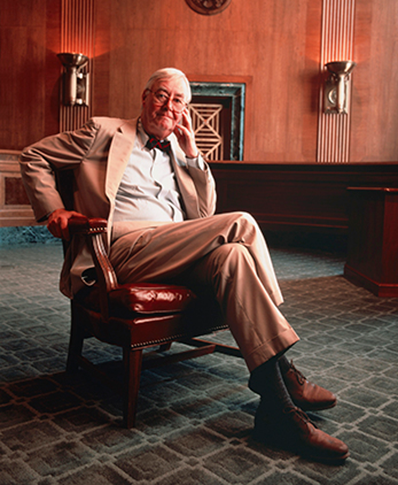
Biography
Daniel Patrick Moynihan—Cabinet officer, diplomat and four-term United States Senator—was one of the foremost public servants and public intellectuals of the second half of the twentieth century.
Moynihan was born in 1927 to an Irish-Catholic family in Tulsa, Oklahoma. The family plunged into poverty and moved to New York City when Moynihan’s father abandoned them. Moynihan grew up largely in New York City during the Great Depression, shining shoes in Times Square and then finding employment as a longshoreman. He attended the City College of New York for a year before joining the United States Navy in 1944. During his officer training, Moynihan enrolled at Tufts University, receiving an undergraduate degree in sociology and eventually a doctorate from the Fletcher School of Law and Diplomacy, where he wrote his dissertation on the International Labor Organization.
Moynihan served on the staff of Governor W. Averell Harriman, Democrat of New York, in whose office he met his future wife and campaign manager, Elizabeth Brennan Moynihan. He left a tenure-track position at Syracuse University to join the John F. Kennedy administration as Assistant Secretary of Labor, a position he retained when Lyndon B. Johnson assumed the presidency. Moynihan left the administration in 1965. After an unsuccessful run for City Council President of New York, Moynihan joined the faculty of Harvard University, and later at the urging of his friend James Q. Wilson, ran the Joint Center for Urban Studies at Harvard and the Massachusetts Institute of Technology.
Beginning in the late 1950s and through the 1960s, Moynihan was a prolific writer for such journals as The Reporter, Commentary and The Public Interest. In 1963, he and the sociologist Nathan Glazer coauthored Beyond the Melting Pot, ushering in a lifelong collaboration on ethnicity and other topics.
In 1969, President-elect Richard M. Nixon invited Moynihan to join his White House as Urban Affairs Advisor, a position with cabinet rank. Sensing that the Democratic Party was experiencing political exhaustion after the turmoil of the late 1960s and believing Nixon could be molded into a Tory reformer on the model of Benjamin Disraeli, Moynihan accepted. After his service in that role, during which his proposal for a guaranteed national income was narrowly defeated in the Senate Finance Committee, Nixon named Moynihan ambassador to India.
In 1975, Moynihan published an essay in Commentary arguing that the United States excessively kowtowed to critics at the United Nations. The essay was a sensation, and President Gerald Ford shortly afterward appointed him U.S. Permanent Representative to the United Nations. Moynihan’s combative defense of freedom—and especially his famed denunciation of U.N. Resolution 3379, which equated Zionism with racism—earned him national fame.
In 1976 he ran for the United States Senate from New York, narrowly winning the Democratic nomination and then comfortably defeating the incumbent conservative senator James Buckley. Moynihan served four six-year terms, a period during which he chaired the Senate Environment and Public Works and Finance Committees, and continued publishing books and articles. Moynihan was known as: a liberal “Cold Warrior” who eventually concluded that the Soviet Union was collapsing under its own weight, a welfare reformer who felt that the 1996 welfare bill was too punitive, and a critic of excessive secrecy in government. His other interests ranged from public architecture (he spearheaded the revival of Pennsylvania Avenue in the nation’s capital) to Social Security (a champion of the program, he helped broker the 1983 deal that staved off insolvency and later served on President George W. Bush’s commission on the future of Social Security) to international law (he fiercely criticized the Reagan administration’s mining of Nicaraguan harbors, applauded the revival of the rhetoric of international law after the Cold War, and wrote a book entitled The Law of Nations).
In 2000, Moynihan was awarded the Presidential Medal of Freedom—an honor he helped create during the Kennedy administration, to which he was integral. Moynihan retired from the Senate in 2001 and was replaced by Hillary Clinton. He died in 2003, and is buried in Arlington National Cemetery.
